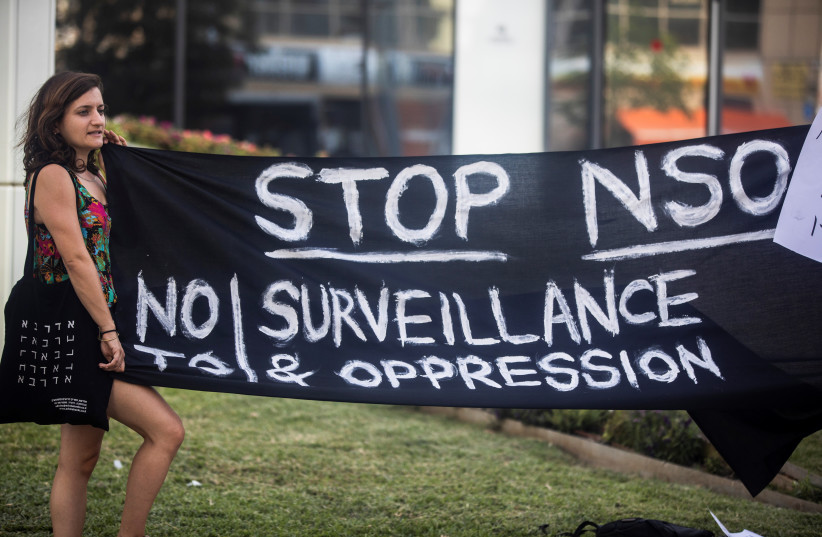While the shockwaves have yet to die down following the decision by the United States to impose economic sanctions on Israeli citizens living in settlements, another drama has emerged from Israel’s greatest ally. This past week, the United States announced new visa restrictions on individuals who have been involved in the misuse of cyber-offense tools (that is, spyware) and individuals who have made financial gain from such misuse, and on the immediate relatives of members of these two groups.
Countries worldwide reducing spyware
It would seem that the United States has decided to join the growing trend, until now particularly evident in Europe, of reducing the use of spyware and maybe even prohibiting its deployment altogether. Because Israel is considered one of the main hubs of cyber-offense tools, any decision restricting workers in this industry represents a severe warning to decision-makers in Israel and to the executives whose names are featured on the websites of spyware companies.
Broadly speaking, Israel is a global power both in terms of cyber defense, as the State in which the firewall was invented, and cyber-offense capacities, as a State that was allegedly involved in the deployment of high-end malware like Stuxnet. It is home to many cyber intelligence companies, such as NSO, most of which were established to pursue worthy goals: countering terror threats; thwarting kidnapping and other crimes; locating survivors after natural disasters; and more.
Past Israeli spyware scandals
At the same time, this industry carries a certain risk, as shown in the Pegasus scandal abroad and in the Saifan crisis domestically, and it requires that the State of Israel strikes a delicate balance between significant competing interests: technological innovation (which affects the country’s geopolitical relations and international image); security needs (which have an impact on individual freedoms); weighty economic interests (as an industry that at its peak has brought in billions of dollars a year in revenues); and, of course, the implications of the use of this technology for the rule of law and democratic values.

This is not the first time the United States has acted against the cyber-offense industry. In 2021, NSO was blacklisted by the US Department of Trade, and last year, President Joe Biden signed a presidential order to limit the use by US authorities of cyber-offense tools that were not produced in the United States. These developments show that in recent years, the cyber-offense industry – and especially NSO, which has come to be seen as symbolic of the industry as a whole – has shifted from being an Israeli success story to a public image challenge that is substantially affecting Israel’s foreign relations. In addition, damage to this industry also means severe financial downfall to the Israeli economy.
The rise of technological arms races
Looking at the planned visa restrictions and Biden’s presidential order from a broader perspective, the issue at hand is, in fact, bigger than Israel: It concerns the technological arms race between the superpowers of the United States, China, and Russia (the three leading states in spyware, alongside Israel). From an Israeli perspective, though, the defense establishment and the government have encouraged the development of the cyber-intelligence industry for many years and have leveraged it to advance international relations with other countries (as was done during the Abraham Accords, for example).
Now, the State of Israel must demonstrate that it is responding to these new developments – for example, by stepping up oversight of the industry. We propose instituting a mechanism for supervision of cyber-offense tools from the initial technological development stage, to enable changes to be made where necessary while they are still in an early stage of work, and thereby to minimize economic damage to the cyber industry and prevent sunk costs. This will be more efficient in terms of supervision and will also create a sense of partnership between the State and the private sector (of importance especially in the technological field).
In sum, the war in Gaza has demonstrated the importance of international legitimacy and support from Israel’s allies, particularly the United States. Israel must take steps that signal to its allies and to the international community its intention to defend the rule of law and promote democratic values while encouraging the cyber industry in Israel, which is a cornerstone of the Israeli economy and greatly influences its international standing.
Being a world leader in technological innovation does not have to mean undermining democratic values and the protection of individual freedoms. In fact, the opposite is true: innovation, security, and human rights go hand in hand.
Dr. Tal Mimran is a lecturer in law and technology at the Hebrew University of Jerusalem and a program director at the Tachlith Institute. Adv. Eden Farber is a researcher at the Tachlith Institute and a lecturer in international law at Zefat Academic College.
